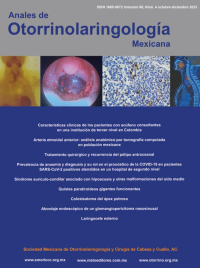
Auriculo-condylar syndrome associated to hearing loss and other malformations of middle ear.
An Orl Mex. 2023; 68 (4): 219-225. https://doi.org/10.24245/aorl.v68i4.9276
Olivia Jiménez Ruíz,1 Alejandro Saúl Moreno Reynoso,2 Sandra Gabriela Juárez García,3 Margarita Arias Velázquez3
1 Médico especialista en Audiología, Otoneurología y Foniatría, Hospital Star Médica Lomas Verdes, Estado de México, México.
2 Médico especialista en Otorrinolaringología y Cirugía de Cabeza y Cuello, Hospital Central Militar, Ciudad de Mexico.
3 Médico especialista en Audiología, Otoneurología y Foniatría, Instituto Nacional de Rehabilitación Luis G Ibarra Ibarra, Ciudad de México.
Resumen
ANTECEDENTES: El síndrome aurículo-condilar, enfermedad genética que afecta el primero y segundo arcos faríngeos durante el desarrollo embrionario, causa anomalías orofaciales y auditivas, entre otras. Uno de los hallazgos notables es la malformación auricular conocida como oreja en signo de interrogación. Pese a su rareza, el diagnóstico temprano es esencial para proporcionar la atención adecuada y mejorar la calidad de vida.
CASO CLÍNICO: Paciente femenina de tres años de edad, padecía el síndrome aurículo-condilar, con variedad de características clínicas, incluyendo malformaciones en el pabellón, la mandíbula, el paladar y otros rasgos faciales. Además, se observó la ausencia de estructuras de la cadena de huesecillos en el oído medio, hallazgo extremadamente raro y que no se había reportado previamente en la bibliografía médica.
CONCLUSIONES: El diagnóstico y manejo adecuado del síndrome aurículo-condilar requiere un enfoque multidisciplinario que incluye evaluación auditiva, terapia del lenguaje, cirugía reconstructiva y otros tratamientos según necesidades individuales. También destaca la importancia de considerar la posible recurrencia en familias afectadas y la necesidad de evaluación minuciosa en casos similares. Insistimos en la importancia de incluir en el protocolo de estudio la evaluación auditiva, ya que las malformaciones del oído medio pueden ser la causa de pérdida auditiva y, por consiguiente, de trastorno del lenguaje. Además, destaca la necesidad de una atención integral para abordar las complejas manifestaciones clínicas de esta enfermedad.
PALABRAS CLAVE: Síndrome aurículo-condilar; orejas en signo de interrogación; pérdida auditiva; trastorno del lenguaje.
Abstract
BACKGROUND: Auriculo-condylar syndrome is a rare genetic disease that affects the first and second pharyngeal arches during embryonic development, causing a series of orofacial and auditory anomalies, among others. One of the notable findings in this disease is the auricular malformation known as question mark ear. Despite its rarity, early diagnosis is essential to provide appropriate care and improve patients’ quality of life.
CLINICAL CASE: A three-year-old female patient with auriculo-condylar syndrome, who showed a variety of clinical features, including malformations of the ears, jaw, palate, and other facial features. Furthermore, the absence of ossicular chain structures in the middle ear was observed, which is an extremely rare finding and has not been previously reported in the medical literature.
CONCLUSIONS: The proper diagnosis and management of patients with auriculo-condylar syndrome requires a multidisciplinary approach that includes hearing evaluation, speech therapy, reconstructive surgery, and other treatments based on the individual needs of each patient. The importance of considering possible recurrence in affected families and the need for thorough evaluation in similar cases is also highlighted. In this case report we emphasize the importance of including hearing evaluation in the study protocol of patients with auriculo-condylar syndrome, since middle ear malformations can be a cause of hearing loss and consequently of a language disorder in these patients. Furthermore, it highlights the need for comprehensive care to address the complex clinical manifestations of this rare disease.
KEYWORDS: Auriculo-condylar syndrome; Question mark ears; Hearing loss; Language disorder.
Recibido: 26 de octubre 2023
Aceptado: 28 de noviembre 2023
Este artículo debe citarse como: Jiménez-Ruíz O, Moreno-Reynoso AS, Juárez-García SG, Arias-Velázquez M. Síndrome aurículo-condilar asociado con hipoacusia y otras malformaciones del oído medio. An Orl Mex 2023; 68 (4): 219-225.

